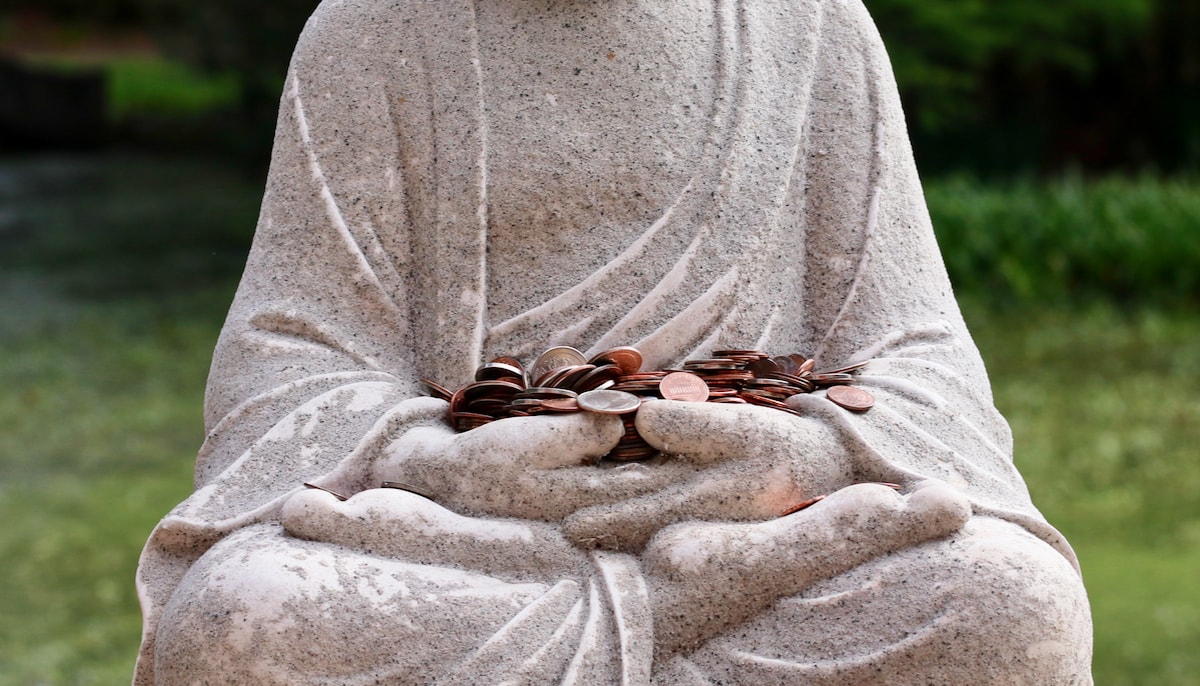There is neither virtue in what is meager; nor evil in what is bountiful. Regardless of wealth or poverty, when the mind of greed arises people lose their beautiful minds. The buddha mind is the mind that knows what is sufficient.
—Eihei Dogen
Lay Buddhist practice affords us a wide latitude in which to practice and learn what is sufficient. In householder life, we can cut our expenses to the bone and throw all our belongings in a river, or we can live in some other extreme, spending money for things and experiences that cause more problems in our lives or the lives of others. Regardless of how we express our lives financially, observing our behavior with money reveals how we approach everything—shining a light on our assumptions, habits, relationships.
Mindfulness of money is a powerful practice. Here are a few ways to become more aware of our financial behavior.
Track spending to the penny
Many people experience vagueness when it comes to money. This can be expressed in not balancing the checkbook, being unclear about regular income and expenses, or living in chaos, anxiety, avoidance, obsession, or resentment about money. A demanding but rewarding antidote to this is to track spending to the penny. Carrying a small notebook to tally cash expenditures, keeping receipts, balancing the checkbook, and noting automated transactions can help create a clearer picture—especially when you add it all up at the end of the month. Tracking our spending, every day, every month, tells the simple truth about what we apparently value. And we can see whether our purchases are aligned with our deepest values.
Notice how you feel when spending
When you record your spending, simply notice (and, if possible, write down) whether the feeling is positive, negative, or neutral. Notice your thoughts, intentions, and body sensations before a purchase and how they change during and after it.
Prioritize the spiritual life in your spending plan
It is important to identify and prioritize the things we value the most. Clearly, we need to prioritize food and shelter. We also need to prioritize things like recreation because constant deprivation often results in a cyclical backlash of overspending. But where do spiritual pursuits fit in relation to rent or going to the movies? Spiritual spending includes things like meditation workshops and retreats, dharma books and CDs, and dana to support ongoing meditation practice.
Without spiritual practice, we become unclear about our other priorities. This is not to say that you should be spending more in the spiritual category than any other, or failing to meet other obligations due to spiritual spending; it simply acknowledges that there is no benefit (and there is potential harm) in going spiritually hungry when there are difficult spending choices to be made. Some spiritual traditions practice tithing as a way to put the spiritual life first, committing a portion of one’s income to support the temple or church. This expresses a recognition that the spiritual life sustains us, and we prioritize supporting ourselves and ultimately others in this way. It is also a way to use the next two practices.
Cultivate gratitude
This can be done very simply by jotting down a gratitude list on a scrap of paper or back of an envelope. Being grateful for having two matching shoes can qualify. Practicing gratitude, we feel rich, full, enough. We can enjoy our public parks that are staffed with caretakers. We can stop and pay attention to our senses and the millions of love notes they are sending us every moment. We can say “thank you,” and really mean it, at every purchase—even when paying bills! For those of us with a tendency toward greed, practicing gratitude can be like eating before you go grocery shopping. And how many times has what seemed like a disaster turned out to have been a blessing in disguise? Aren’t some of our life’s biggest challenges the source of our deepest wisdom? When we are practicing gratitude, we can transform those arrows into flowers sooner rather than later.
Cultivate generosity
In his book Buddhist Economics: A Middle Way for the Market Place, Ven. P.A. Payutto says the purpose of spending and consumption is not to satisfy our desires for comfort or ego-gratification, but rather to enhance the quality of life for ourselves and others, and to benefit the environment. This means harmonizing our own interests with those of others and with our environment. Often, this means reflecting upon what is the most beneficial use of our resources, and sharing what we have. An act of generosity does not have to be monumental. Perhaps give something small to a coworker anonymously, like a gift card to their favorite coffee shop, or choose one of your belongings that has value or meaning to you, and give it to a friend.

